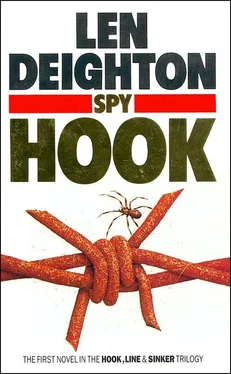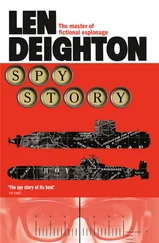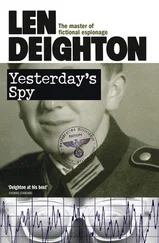Len Deighton - Spy Hook
Здесь есть возможность читать онлайн «Len Deighton - Spy Hook» — ознакомительный отрывок электронной книги совершенно бесплатно, а после прочтения отрывка купить полную версию. В некоторых случаях можно слушать аудио, скачать через торрент в формате fb2 и присутствует краткое содержание. Жанр: Триллер, на английском языке. Описание произведения, (предисловие) а так же отзывы посетителей доступны на портале библиотеки ЛибКат.
- Название:Spy Hook
- Автор:
- Жанр:
- Год:неизвестен
- ISBN:нет данных
- Рейтинг книги:4 / 5. Голосов: 1
-
Избранное:Добавить в избранное
- Отзывы:
-
Ваша оценка:
- 80
- 1
- 2
- 3
- 4
- 5
Spy Hook: краткое содержание, описание и аннотация
Предлагаем к чтению аннотацию, описание, краткое содержание или предисловие (зависит от того, что написал сам автор книги «Spy Hook»). Если вы не нашли необходимую информацию о книге — напишите в комментариях, мы постараемся отыскать её.
Spy Hook — читать онлайн ознакомительный отрывок
Ниже представлен текст книги, разбитый по страницам. Система сохранения места последней прочитанной страницы, позволяет с удобством читать онлайн бесплатно книгу «Spy Hook», без необходимости каждый раз заново искать на чём Вы остановились. Поставьте закладку, и сможете в любой момент перейти на страницу, на которой закончили чтение.
Интервал:
Закладка:
We were sitting in one of the booths near the window. When we were kids we had all firmly believed that the people in the window seats got bigger portions to attract passers-by. I still don't know whether it's true or not but it wasn't something that either of us wanted to take a chance on.
'You can't trust music critics,' I said. Toscanini could have told him that.'
I'll bet that his jukebox is not insured,' said Werner. He had the sort of mind that thought in terms of expenditure, percentages, interest rates, risk and insurance.
'It was offered cheap,' I explained. 'Willi thought it would bring more teenagers.'
'He'd make a lot of money from penniless teenagers, wouldn't he?' said Werner with heavy irony. 'He should be glad they keep away, not trying to find a way of attracting them.'
Even after a lifetime's friendship, Werner could still surprise me. It was his often expressed view that juvenile delinquency was to be blamed on TV, single-parent families, unemployment or too much sugar in the diet. Was this new reactionary stand against teenagers a sign that Werner was growing old, the way I'd been all my life?
Werner made his money by avalizing: which means he financed East European exports to the West with hard currency borrowed from anywhere he could get it. He paid high interest and he lived on narrow margins. It was a tough way to make a living but Werner seemed to flourish on the hazards and difficulties of this curious bywater of the financial world. Like many of his rivals he had no banking experience, and his formal education went no further than the legerdemain that comes from prodding a Japanese calculator.
'I thought you liked young people, Werner,' I said.
He looked at me and scowled. He was always accusing me of being intolerant and narrow-minded, but on the issue of keeping my haunts Jungend-frei I was with him, and so were a lot of Berliners. You don't have to walk far down Potsdamer Strasse before starting to believe that universal military conscription for teenagers might be a good idea.
There was something different about Werner today. It wasn't his new beard – a fine full-set with moustache – when it was fully grown he'd look like a prosperous Edwardian beer baron or some business associate of Sir Basil Zaharoff. It wasn't just that he was noticeably overweight, he was always overweight between his dedicated summing regimes; nor the fact that he'd arrived absurdly early for our appointment. But he was unusually restless. While waiting for the meal to arrive he'd fidgeted with the salt and pepper as well as tugging at his earlobes and pinching his nose and staring out of the window as if his mind was somewhere else. I wondered if he was thinking of some other appointment he had, for Werner, in his tailormade suit and silk shirt, was not dressed for this sort of eating-place.
We were in Leuschner's, a once famous and fashionable café near Potsdamerplatz. It was shabby now and almost empty. It had been like this for many years, for the great expanse of Potsdamerplatz – once the busiest traffic intersection in all Europe – was now a still and silent place where armed sentries patrol constantly between the massed barbed wire and, with a compassion not extended to their fellow-countrymen, carefully restrain their attack-trained dogs from running into the minefields. And as the district became a backwater, Café Leuschner became the sort of place where men were cautious what they said to strangers, and policemen came regularly to inspect everyone's identity papers.
Once great luxury hotels stood here, adjacent to the mighty Anhalter railway terminal, that was the biggest in the world. The posters in the museum listed one hundred and forty-five trains arriving each day, eighty-two of them long-distance luxury expresses that came complete with cocktail bars, sleeping compartments and diners. Beneath the road, by means of a specially constructed tunnel, baggage porters, labouring under steamer trunks and cases made of the hides of crocodile and pig, and smartly dressed pages conducted the arriving passengers under the swirling traffic^ directly into the plush foyer of the famous Excelsior Hotel next door. Here they would be conveniently close to the fine shops of Leipziger Strasse, the embassies, palaces and grand houses that adjoined the Tiergarten, and the government offices of the newly created German Reich and the Palace of its Emperor. By day the traffic seemed never-ending; and the night-life continued until breakfast was served free to any reveller who was still awake.
Now the Anhalter Bahnhof is gone, except for a large section of old yellow brickwork that used to be the ticket hall. In summer it is lost amid a tangle of weeds. Behind it, as Werner and I had discovered in our schooldays, there is a vast no-man's-land of rusting rails, collapsed roundhouses, skeletons of old sleeping cars and signal boxes complete with handles that could be pulled. No one has passed this way since the last train left for Magdeburg in April 1945. It remains empty except for a few tramps and fugitives who spend a night sheltering in the wrecked buildings but find them too inhospitable even for their stark needs.
Grimy and neglected, this is a neighbourhood of derelict bombed buildings, roofless facades that might look like some phony cityscape built for a film, except that they are so filthy. Now this place, which once seemed like the centre of all Europe, is nothing. It is just a place past which traffic hurries to get to the newspaper offices of Kochstrasse, or to Checkpoint Charlie, which is only a short distance along this garbage-littered thoroughfare that skirts the Wall.
But Café Leuschner remains. Willi Leuschner, despite such lapses as installing a jukebox, knows how to tap a glass of strong Berlin Beer, and his Austrian wife still produces once a week the best Tafelspitz in town. And the tender boiled beef comes with little potato dumplings and the cabbage is cooked in dripping and has carraway seeds to flavour it.
As Werner came to the end of his huge portion of beef, dipping the final forkful into rather too much horseradish, it was time to tackle again the subject I'd come here to talk to him about. I said, 'Well, I thought Lisl looked awfully well.'
'You only saw her for five minutes,' said Werner, wiping the final smear of horseradish from his plate with a crust of bread roll. Frau Leuschner's powerful horseradish did not affect Werner as it did me.
'She was sleeping this morning so I didn't want to disturb her.' I put the prongs of my fork into the horseradish I'd abandoned, and tasted it again. It was very very hot.
'She's a stupid old woman,' said Werner, with a sudden paroxysm of uncharacteristic bitterness. It was a measure of his frustration. 'The doctor told her again and again to lose weight and take things easy. She drinks, she smokes, she gets excited, she argues and loses her temper. It's absurd.' Perhaps it wasn't bitterness so much as grief that I heard in his voice.
'You say she had a stroke?'
'The hospital gave her tests and said they couldn't be sure.' He put the last piece of bread in his mouth and chewed it. 'But either way she'll have to have a complete rest.'
'Who will arrange about selling the house?' Even as I said it I realized what a big task was involved. There would be meetings with the property agents and with the bank, a lawyer and a tax accountant too, plus all the form-filling and petty bureaucratic rigmarole that makes such simple transactions into a nightmare. 'It would be better if we could persuade Lisl to go away until it's all done. Perhaps we could find a place in Baden-Baden. She's always talked about taking a holiday in Baden one day.'
He looked at me and gave a twisted little smile. 'And which of us is going to explain all this to Lisl?' he asked.
Willi Leuschner came over to the table to clear the plates. 'What are you two having now?' said Willi. 'Bread pudding?' Willi was my age but his head was bald, and the big curly moustache that he'd grown as a joke was grey with age and yellow with nicotine.
Читать дальшеИнтервал:
Закладка:
Похожие книги на «Spy Hook»
Представляем Вашему вниманию похожие книги на «Spy Hook» списком для выбора. Мы отобрали схожую по названию и смыслу литературу в надежде предоставить читателям больше вариантов отыскать новые, интересные, ещё непрочитанные произведения.
Обсуждение, отзывы о книге «Spy Hook» и просто собственные мнения читателей. Оставьте ваши комментарии, напишите, что Вы думаете о произведении, его смысле или главных героях. Укажите что конкретно понравилось, а что нет, и почему Вы так считаете.












